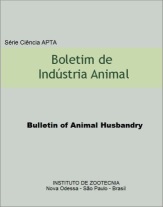EFFECT OF PHOSPHATING ON SOIL CHEMICAL ATTRIBUTES AND CULTIVATION OF SUGARCANE FOR FORAGE
DOI:
https://doi.org/10.17523/bia.v74n3p213Keywords:
decanted phosphate, monoammonium phosphate, Saccharum spp.Abstract
Phosphorus (P) is an essential element for the cultivation of sugarcane, which plays an important role in rooting, tillering and forage production. With the objective to evaluate the effects of pre-planting phosphating on soil chemical attributes and sugarcane growth for forage production, an experiment was conducted at the Santa Mercedes plant, Tupi Paulista, SP, using the RB 86 7515 variety. The experimental design consisted of random blocks with 8 treatments and 4 replicates, totaling 32 experimental units, in a 2 x 4 factorial scheme including two P sources (decanted phosphate and monoammonium phosphate) and four P doses (0, 80, 120, and 160 kg/ ha P2O5). The P sources and doses tested increase the availability of P in soil, with the dose of 120 kg/ha P2O5 providing the highest production of green forage mass. Monoammonium phosphate as P source reduces soil pH and increases the availability of micronutrients such as iron, boron and zinc.Downloads
Downloads
Published
Issue
Section
License
Os autores não serão remunerados pela publicação de trabalhos, pois devem abrir mão de seus direitos autorais em favor deste periódico. Por outro lado, os autores ficam autorizados a publicar seus artigos, simultaneamente, em repositórios da instituição de sua origem, desde que citada a fonte da publicação original seja Boletim de Indústria Animal. A revista se reserva o direito de efetuar, nos originais, alterações de ordem normativa, ortográfica e gramatical, com vistas a manter o padrão culto da língua e a credibilidade do veículo. Respeitará, no entanto, o estilo de escrever dos autores. Alterações, correções ou sugestões de ordem conceitual serão encaminhadas aos autores, quando necessário. Nesses casos, os artigos, depois de adequados, deverão ser submetidos a nova apreciação. As opiniões emitidas pelos autores dos artigos são de sua exclusiva responsabilidade. Todo o conteúdo deste periódico, exceto onde está identificado, está licenciado sob a Licença Creative Commons Attribution (CC-BY-NC). A condição BY implica que os licenciados podem copiar, distribuir, exibir e executar a obra e fazer trabalhos derivados com base em que só se dão o autor ou licenciante os créditos na forma especificada por estes. A cláusula NC significa que os licenciados podem copiar, distribuir, exibir e executar a obra e fazer trabalhos derivados com base apenas para fins não comerciais.













